Rabbinical and Cantorial Class of 2022/5782 Scholarship
Please help us reach our scholarship goal of $20,000!
During our time at Hebrew College, we’ve made an investment in learning together, working alongside each other, and growing as Jewish leaders. We’ve had the opportunity to learn from extraordinary teachers in a diverse and pluralistic community. We are grateful for our friends, family, and everyone who has supported us throughout our years of learning.
In celebration of our ordination, we created a scholarship fund to support the Hebrew College rabbinical and cantorial programs and more amazing future rabbis and cantors. Please help us support this institution that is so near and dear to our hearts!
Sara Blumenthal
Batya Elana Ellinoy
Giulia Fleishman
DJ Fortine
Joey Glick
Genevieve Rachel Greinetz
Marc Guttman
David H. Joslin
Stephanie Kennedy
Talia Laster
Frances Michal Raffel Sandmel
Yael Werber
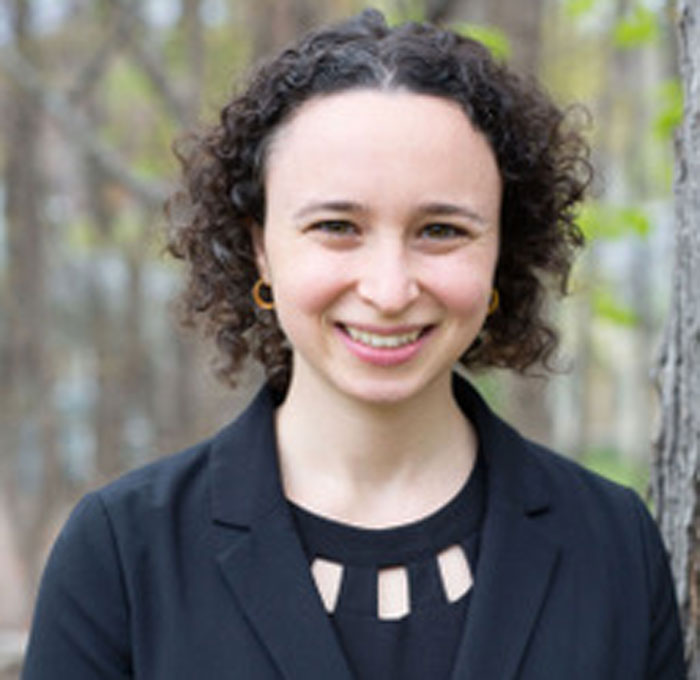
Sara Blumenthal
פְּתַח לִבִּי בְּתוֹרָתֶךָ, וּבְמִצְוֹתֶיךָ תִּרְדּוֹף נַפְשִׁי
Open my heart to your Torah, and may my soul pursue
your commandments. Berakhot 17a
These words, silently uttered at the end of the Amidah in a moment of private devotion, speak to me of a yearning for God’s presence and Torah in the world. At once powerful in their command form and intimate in their first-person voice, they illustrate the oscillating feelings of distance and closeness in the human-Divine relationship.
When I whisper these words to myself, I pray that I may draw closer to God through my Torah learning and meaningful fulfillment of the mitzvot. To ask God to open our hearts to God’s Torah is to be open to discovering Torat Hayyim, the Torah of every life.
In this technological age, it is difficult to be open to encountering Torah all the time. It feels that we are constantly rushing from one place or Zoom meeting to the next, often concerned with what’s right in front of us. With so many things competing for our attention, how do we make time to cultivate awareness of the Torah and divinity around and within us?
Slowing down—to say hello to a new bud in the spring, to deepen into the wordless melody of a niggun, to unpack a single word of text—has been one of my most profound learnings in rabbinical school. This, too, is Torah, and I cherish the opportunities I have been given to pause, reset, and connect with the infinite expressions of divinity in the world.
Engaging in Torah study attunes me to beauty and gratitude as well as to the pain and suffering around me, as the human condition and natural world are reflected back to me in all their complexity. Ki hem hayenu v’orekh yamenu, we say in the evening service. Torah is our life and the length of our days. What a gift it is to be among its inheritors and co-creators.
It has been an immense blessing to immerse myself in rich Torah learning with fellow seekers for the last five years. My classmates and teachers have not only taught me deep insights, pushed my thinking, and encouraged me to share my voice but also have modeled open-hearted lives guided by Torah. I am incredibly grateful to my mentors, internship communities, CPE cohorts and educators, and spiritual directors for guiding my professional and spiritual growth and for touching my life in invaluable ways.
My family and friends have been the most steadfast supporters during this transformative experience. Thank you for accompanying me on this journey; I could not have arrived at this juncture without you. As we say at the end of reading a book of Torah, hazak hazak v’nithazek. May the Torah we learn and live by continue to strengthen and anchor us.
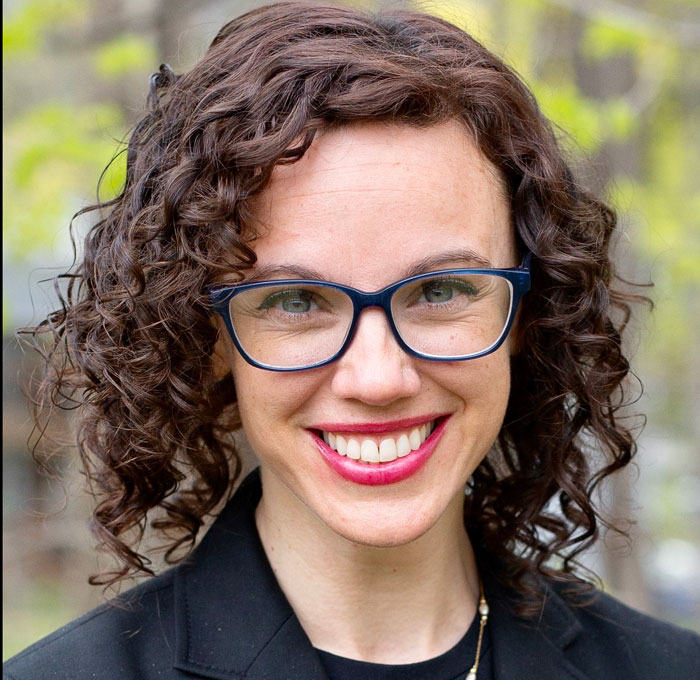
Batya Elana Ellinoy
,שִׁמְעוֹן הַצַּדִּיק הוּא הָיָה אוֹמֵר
ַַעַל שְׁלשָׁה דְבָרִים הָעוֹלָם עוֹמֵד, עַל הַתּוֹרָה וְעַל הָעֲבוֹדָה וְעַל גְּמִילוּת חֲסָדִים
Shimon Hatzadik would say, “On three things the world stands: on the Torah, on service and on acts of lovingkindness.” Pirkei Avot 1:2
For as long as I can remember, I have always had an insatiable drive for learning, for being a part of the healing in this world, and for celebrating life through acts of love and kindness. What inspires and motivates me is aligned with the teaching of Shimon Hatzadik from Pirkei Avot, the Ethics of the Sages, who states that the three things upon which the world rests are Torah, service, and deeds of loving-kindness.
According to a story that my mom tells about me as a toddler, I used to parade around the house singing the above-mentioned verse from Pirkei Avot, but instead of the actual Hebrew words, Al shlosha devarim I sang what I thought I was hearing, “I’ll sure share with my rings!”
As I become a rabbi, I know and feel that same desire as I did as a singing toddler “to share with my rings!” These “rings” to share are those of my ever-growing love for Torah, those of continually seeking and finding where I can be of leverage for healing and service within the Jewish community and beyond, and those of acting in ways that express my deep love for this world.
This sacred time and space at Hebrew College of deeply engaging with Torah, of richly reflecting on and practicing what it means to be of service, and of experiencing being a loving and loved part of this community has only deepened my connection to these things on which the world rests and to share of my gifts for the benefit of the whole.
Kosi Revaya—My cup overflows with gratitude to the Source of Life for all of the gifts of this journey and for those who supported me to embark on and make it through this holy ride of rabbinical school, enabling me to reach this moment: ancestors, my dear parents and family, rabbis, teachers, mentors, my spiritual director and cohort, chevrutot, colleagues, dear friends, and all the blessings from the natural world. Thank you for supporting a rebirth of my soul. I take you with me into the next chapters of my journey.
לְמַעַן אַחַ֣י וְרֵעָי אֲדַבְּרָה־נָּא שָׁלוֹם בָּךְ
For all of my beloved teachers, family, and friends: May you know peace and wholeness.
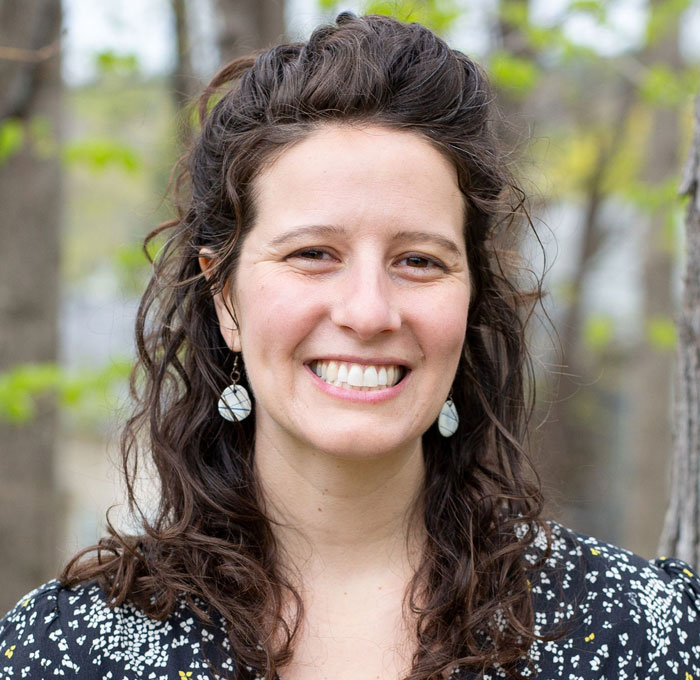
Giulia Fleishman
עֵת לְהַשְׁלִ֣יךְ אֲבָנִ֔ים וְעֵ֖ת כְּנ֣וֹס אֲבָנִ֑ים
A time to cast off stones and a time for gathering stones
Ecclesiastes 3:5
These words have guided me in my (personal/spiritual/academic/professional) life and resonate with my hopes for what it means for me to be a spiritual caregiver in this world:
עֵת / time
Learning to discern when any moment may be ripe for change, learning, growth, presence, pointing me to discover meaning and purpose even when I’m surrounded by doubt—וּמִ֣י יוֹדֵ֔עַ אִם־לְעֵ֣ת כָּזֹ֔את הִגַּ֖עַתְּ לַמַּלְכֽוּת—and who knows, perhaps it was for this very moment that you achieved royalty. (Esther 4:14)
לְהַשְׁלִ֣יךְ / cast off
Discovering what is within that I/we need to let go of, to fling from ourselves, practicing gestures of release.
אֲבָנִ֔ים / stones
Stone as Divine metaphor. By this I mean an enduring witness to life—calm, present, memory-filled, sometimes easy to miss. Growing up collecting stones on the beach, a constant reminder to return to nature as my spiritual home.
כְּנ֣וֹס / gathering
The Hebrew for synagogue is בֵּית כְּנֶסֶת—beit knesset, which I would like to translate here as a home of gathering. I am deeply grateful for all the homes of gathering and the gatherings in which I have been at home, that have nurtured and nourished me on this path, as well as my dreams of home-gatherings yet to come.
With abundant gratitude and indebtedness to all who have been a part of my life’s gathering: My brilliant teachers and classmates at Hebrew College and Pardes, my beloved Pod (dogs included), all of the wise and compassionate members and leaders of The Martha’s Vineyard Hebrew Center and The Community Hevra Kadisha of Greater Boston, the incredible supervisors, teachers, mentors and colleagues of my clinical pastoral education units at Hebrew SeniorLife (HSL), Baystate Medical Center, Beth Israel Deaconess Medical Center, Havli Satellite of HSL as well as my internships at HSL, 2Life Communities and Congregation Betenu, my dear friends and family in Boston and beyond, and my parents whose lives – and deaths—I weave into my own daily.
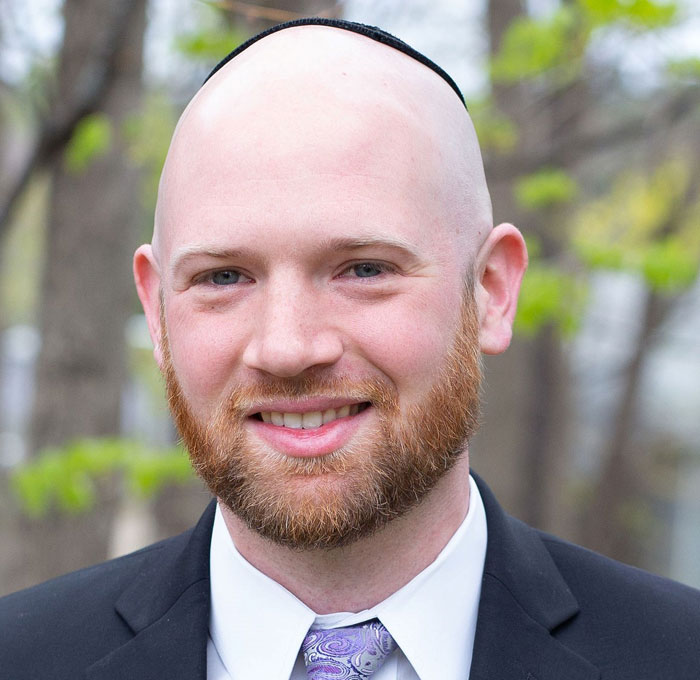
DJ Fortine
ֶּבֶּן זוֹמָא אוֹמֵר, אֵיזֶהוּ חָכָם, הַלּוֹמֵד מִכָּל אָדָם… אֵיזֶהוּ עָשִׁיר, הַשָּׂמֵחַ בְּחֶלְקוֹ
Ben Zoma asks: who is wise? The one who learns from every person… Who is rich? The one who rejoices in their portion
Pirkei Avot 4:1
My journey to the cantorate was born, in part, out of a desire to pursue the of wisdom that Ben Zoma drashes on in Pirkei Avot. The greatest joy of my time at Hebrew College has been the opportunity to engage in fellowship with such a rich pluralistic cross section of b’nei adam to learn with and from. I’m immensely thankful for the chance to continually encounter Jewish ideas and ritual experiences that I had not been able to earlier in my Jewish journey. Exposure to this breadth of perspectives and a resultant depth of new knowledge help to comprise the portion in which I rejoice today.
שִׁירוּ לַיהֹוָה שִׁיר חָדָשׁ
Sing unto God a new song. Psalm 96:1
I came to Hebrew College in 2017 having already developed an enthusiasm for contemporary Jewish music, and for making that music accessible to the Jewish communities that I served. Now, having delved into immersive study of liturgy, nusach hat’filah, and cantillation of sacred text at Hebrew College, I seek to ensure that the shirim chadashim—the new songs that I sing—pay testament to those ancient melodies MiSinai, and reflect the bountiful musical traditions of the Jewish People.
I’m grateful for all the teachers and who have helped me reach this milestone. Thank you to Lynn Torgove for your thoughtful guidance over the years. Thank you to Amy Lieberman for your expert musicianship and conducting prowess. Thank you to Joshua Jacobson for your diligent scholarship in the realms of cantillation and Jewish music history. Thank you to Brian Mayer for your fastidious stewardship of nusach hat’filah. Thank you to Allan Lehmann and Shayna Rhodes for making Mishnah and Gemara feel so pertinent and accessible. Thank you to Rachel Adelman and Harvey Bock for helping me more ably unravel and make sense of ancient literature.
Thank you to all of my cantorial coaches and advisors, namely: Erik Contzius, Jeff Klepper, Robbie Solomon, Brian Mayer (again), Matt Austerklein, Michael McClosky, and Kevin Margolius. You are all exemplars of dedication to our vocation, and I treasure your mentorship.
I owe tremendous, tremendous thanks to Rabbi Todd Markley, Rabbi Jay Perlman, and the entire extraordinary kehillah at Temple Beth Shalom of Needham for bringing me to Boston in 2016 and enabling me to thrive in both my professional and educational ventures as I’ve pursued cantorial ordination. I take such great pride in serving our holy community!
Thank you to the Joseph Eisner Camp Institute for Living Judaism for providing me with strong Jewish role models, fostering my love of Jewish music, and for cultivating my aptitude as a song-leader during my youth and adolescence.
I am, of course, indebted to my entire family for their unwavering support, and to my partner in life, Alli, whose dedication, encouragement, and loving nudging I would not be here without!
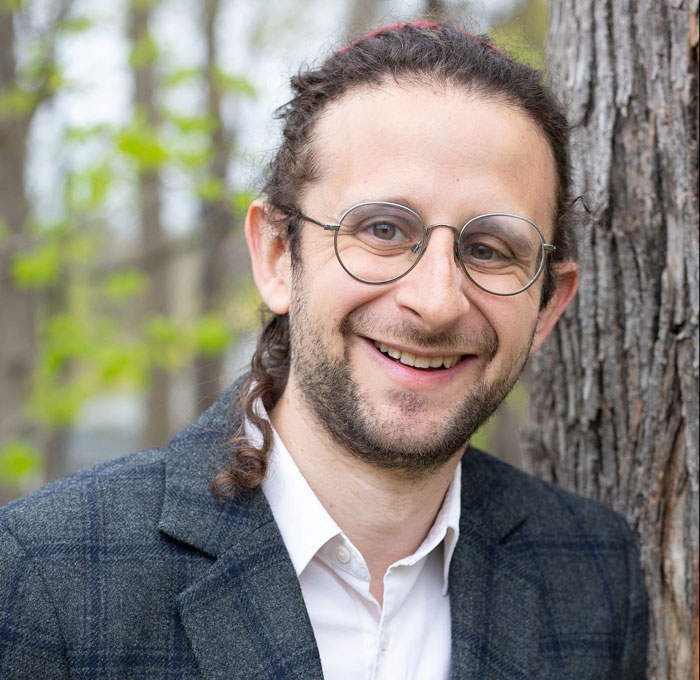
Joey Glick
כָל הַנְּבִיאִים נִסְתַּכְּלוּ בְּאַסְפַּקְלַרְיָא שֶׁאֵינָהּ מְאִירה
All prophets see through an obscuring lens. Yevamot 49b
I wrote my Hebrew College admission essay on the spiritual impact of being nearly blind out of my left eye. Since birth, I have been able to see only whirls of shape and color through that eye. For most of my life, I have leaned on my functional right eye to navigate space, read, and learn. In my application essay, I wrote about my hope to spend more time in the softer, kaleidoscope world of my left eye. I wondered what mysteries and questions might live within this vision.
In the closing moments of rabbinical school, a line of Talmud reminded me of this goal: All prophets see through an obscuring lens. (Yevamot 49b) I love the vision of leadership that emerges from this text. The rabbis of Yevamot suggest that a Jewish leader must never see things quite as they are. Rather, they must harness their imagination, their grounding in Torah, and their hope to see a world colored by the past and healing towards a future.
The passage in Yevamot has made me realize that my rabbinical education has been something like a 5-year long trip to a mystical optometrist. Each of my teachers and chavrutahs has offered me new looking glasses through which to see Torah, humanity, our past and our future. Rather than making my sight clearer, these lenses on top of lenses have distorted and adorned my vision, making the world appear more complicated, more tender, and more whole.
The rabbis used the word אַסְפַּקְלַרְיָא to refer not only to lenses, but also to mirrors. As such, the rabbis of Yevamot might be telling the aspiring Jewish leader to look not just out, but also in, towards all the stories, relationships and loves that surround us. As I hold a mirror up to my life these past five years, I see the fierce love of my partner, Adele, whose faith in me and care for me are my guiding light. I see a seminar table surrounded by my cohort of ten as we hold each other and Torah with laughter and tears. I see a kitchen filled with housemates, podmates and friends doing extraordinary things (and making extraordinary food) to support each other and find joy in challenging times. I see the gifts of my family, the socks, robots, cartoons and phone calls, each gift reminding me that I am rooted and loved. I see the wisdom of teachers from so many communities: Hebrew College, Nehar Shalom, Beth Jacob, Shaaray Tefila, the Community Hevra Kadisha of Greater Boston, Hebrew Senior Life, and the chapels at Beth Israel Deaconess Medical Center, Colorado College, and Vassar College. As I look at this reflection, I struggle to believe my luck and give thanks for all the love that has and will continue to form me.
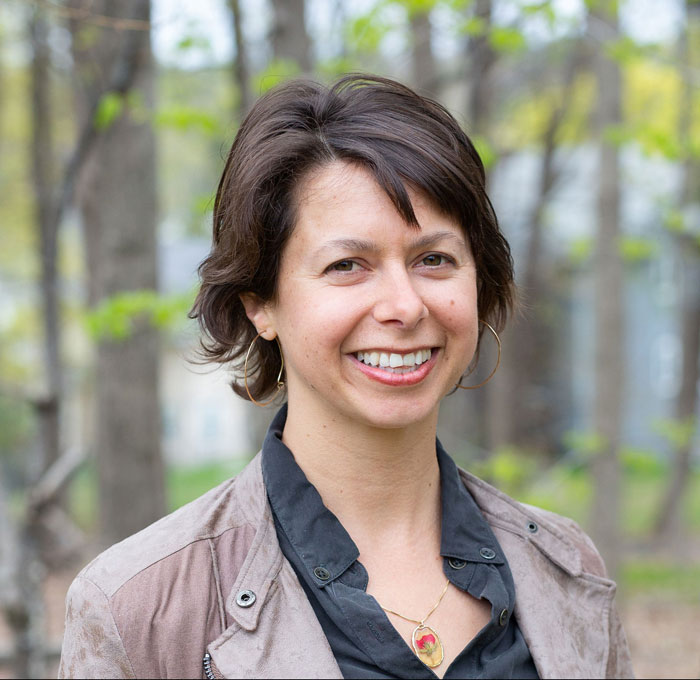
Genevieve Rachel Greinetz
Hineni – a creative adaptation הִנְנִי
Here I am, imperfect and incomplete, but standing here, excited, and terrified before You, God. I am here propelled by a force of community and ancestry that I don’t understand, but I am here with my gifts, with my flaws. I’m here praying that You’ll be with me on this path, that You’ll grant success to me in my efforts to be in service to others; I am here ever seeking Your compassion for myself, for all those who will call me Rabbi. Do not let my shortcomings reflect in those I serve, do not let theirs reflect in me—Be compassionate with us in our humanity and let us be kind to one another in our wholeness. Receive my prayer like a familiar, old hymn, like a song You love to listen to. Turn our bitterness to sweetness. May it be Thy will, my God, that this prayer reaches You. Receive my path as a continuation of these syllables, as a prayer for goodness in the world because You listen with nurturing compassion. Blessed are You, God, who hears prayer.
—
I realized I wanted to be a rabbi at my grandfather’s shiva in an irrational moment of unexpected yet ringing clarity. Although I changed the direction of my life after hearing that call, it took two years before I began at Hebrew College. I mention this now because I can’t look at my life and understand what I am doing with logic, I have, instead, to engage in a process of trust. Even while I struggle to be a person of faith and to “understand,” logically, what that means, my path rests on faith, on trust, on something unknown, something greater than myself, a current that humbles me.
I brought in the Hineni prayer because this is all I can do—to arrive here as I am with an honest willingness to be of service. To show up, offer what I can, and to keep walking the varying terrains of the religious path. My promise is to be here wholeheartedly and to heed the call each time I hear it, to be a rabbi to the best of my ability. I know that my mind, my beliefs, my practices – all of these things are in flux as I continue to learn, to be humbled, to be convinced of wisdom, to be tossed into the void of meaninglessness, but no matter who I logically conceive of myself to be in a given moment, I am here, with my full humanity and with my hands open. I am here with a heart of trust and faith even while I don’t conceptually understand, I am here—my heart beats wiser than my thinking mind.
It is a great privilege to have gotten to spend six years studying, and truly to walk on this path at all. I am grateful beyond words to my family and friends for their ongoing, generous support, and to all my teachers, role models, chevrutot, and mentors for the gift of learning and the grace of inspiration. Thank you to the Hebrew College faculty and staff and to all I was fortunate to learn with in internships, as well as in my time spent in Israel and in California. A never-ending debt of gratitude, too, to the many nonhuman beings who sustain our existence and have enriched my life and path. For all of this, I am in awe and dedicated to living out the goodness bestowed on me by you, thank you.
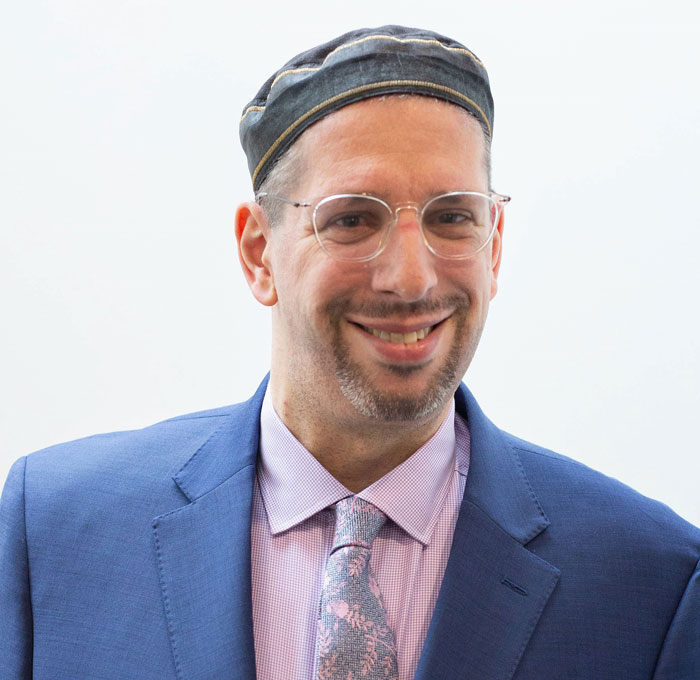
Marc Guttman
:וַיִּקַּח יְהוָה אֱלֹהִים אֶת-הָאָדָם וַיַּנִּחֵהוּ בְגַן-עֵדֶן לְעָבְדָהּ וּלְשָׁמְרָהּ
God settled the Human in the garden of Eden, to till it and tend it. Genesis 2:15
The word עֲבֹדָה, Avodah comes from the Hebrew verb “La’Avod” meaning “to serve” and is the same word used for prayer. It informs us of God’s desire that our work and our worship should be our way life.
Reflecting on my life, I realize I’ve tried to serve others as far back as I can remember. As a child, I would check on classmates if I had seen them upset. I have always been there to listen, encourage and provide support to others when they are facing tough times. Sometimes it is as simple as holding a hand or offering a hug. My service continued to my position as a desktop technical support specialist—making sure someone’s laptop is working when they are freaking out about the “blue screen of death” is truly a service!
As I started telling friends that I was pursuing cantorial ordination, one of my oldest friends said that he wasn’t surprised considering how involved I’d been in our synagogue youth group. It seems as though, I felt a calling even as a teenager. Even though I embarked on my journey to receive ordination at Hebrew College eighteen years ago, I thought the opportunity was lost after I received my master’s degree in 2014. As is often the case, life happened, and circumstances required me to step away. I thought I was done. However, a calling being a calling, the need to return and finish what I started came back strongly at the end of 2016 as my father was dying.
עֲבֹדָה—Avodah
I sang to my father during that time. It was my way of offering him comfort and peace. And after he died, I stood four days later at his funeral and sang, and in that moment, I knew I had to figure out how to finish what I’d started so many years earlier.
And here we are. The calling to serve has only gotten stronger over these last four years. I feel the need to serve as teacher, mentor, friend, husband, father, brother, son, and Hazzan. It is my great hope that I will be privileged to serve in a community where my life experience and the knowledge I have obtained will help to nurture and encourage the next generation of potential teachers, mentors, parents, children, siblings, partners, hazzans, and rabbis.
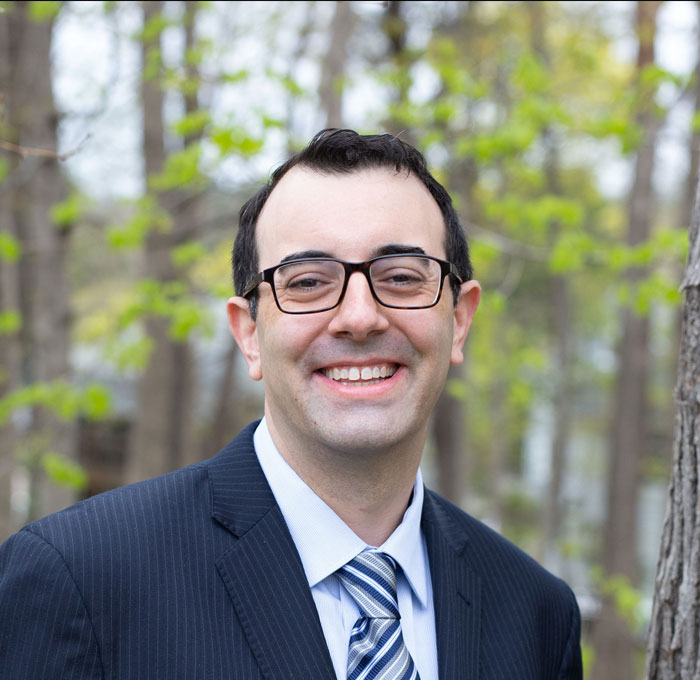
David H. Joslin
ַַוַתֹּ֗אמֶר הִנֵּה֙ שָׁ֣בָה יְבִמְתֵּ֔ךְ אֶל־עַמָּ֖הּ וְאֶל־אֱלֹהֶ֑יהָ שׁ֖וּבִי אַחֲרֵ֥י יְבִמְתֵּֽךְ׃
וַתֹּ֤אמֶר רוּת֙ אַל־תִּפְגְּעִי־בִ֔י לעָזְבֵ֖ךְ לָשׁ֣וּב מֵאַחֲרָ֑יִךְ כִּ֠י אֶל־אֲשֶׁ֨ר תֵּלְכִ֜י
אֵלֵ֗ךְ וּבַאֲשֶׁ֤ר תָּלִ֙ינִי֙ אָלִ֔ין עַמֵּ֣ךְ עַמִּ֔י וֵאלֹהַ֖יִךְ אֱלֹהָֽי׃
בַּאֲשֶׁ֤ר תָּמ֙וּתִי֙ אָמ֔וּת וְשָׁ֖ם אֶקָּבֵ֑ר כֹּה֩ יַעֲשֶׂ֨ה יְהֹוָ֥ה לִי֙ וְכֹ֣ה יוֹסִ֔יף כִּ֣י
הַמָּ֔וֶת יַפְרִ֖יד בֵּינִ֥י וּבֵינֵֽךְ׃
So, she [Naomi] said, “See, your sister-in-law has returned to her people and her gods. Go follow your sister-in-law.” But Ruth replied, “Do not urge me to leave you, to turn back and not follow you. For wherever you go, I will go; wherever you lodge, I will lodge; your people shall be my people, and your G-d my G-d. Where you die, I will die, and there I will be buried. Thus, and more may the LORD do to me if anything but death parts me from you.” Ruth 1:15-17
Throughout this year whether discussing conversion themes for my Capstone Project in Masachet Yevamot, learning about the 5 Megillot, or in preparing for Shavout, I have frequently visited the Book of Ruth, in particular this brief but powerful exchange between Ruth and Naomi. When I pause to recall the stories that initially sparked my passion to pursue a life of Jewish learning, I remember the feeling that the Book of Ruth invoked when I first heard it during Laila Tikkun Shavous. While the ancient rabbis focus much of their attention on constructing a formal framework for conversion to Judaism out of the dialogue, one in which clearly resonated in my own Jewish journey, the interaction between Ruth and Naomi always struck me more as a story of love. Indeed, it is a love story based on mutual respect, admiration, and maybe even a little despair. It is in-fact this very interpersonal bond that evolves between two kindred spirits which sets the foundation for the more captivating tale of devotion to develop, the love of peoplehood. In seeking the comfort of Naomi and her customs, Ruth outwardly cries for any sense of hope, a future, but also a past, a history, and inevitably a story-one that ends with a people and a community to call home.
As I sat before the Beit Din on my own conversion court over 17 years ago, I can vividly remember the head rabbi cutting straight to the chase when he blurted out, “Why do you want to convert? What’s so special about being Jewish?” I explained how much I loved learning about and discussing Jewish history, waving the lulav, retelling the Exodus every Pesach, the idea of visiting Israel, and the pure joy of signing Shabbat melodies. The head rabbi then yelled out, “WHAT ABOUT G-d?!?! What about your love for G-d!” Of course, it is the love of G-d that has brought me to the Jewish people! Yet, it’s my admiration, respect, and love of G-d which makes me want to share that joy in a sacred community. What I ultimately desire is to be wildly, madly in love with a nation, a people; the same elusive community Ruth sought and Naomi provided!
It is this same burning desire which brought me to Judaism, Israel, and inevitably the decision to serve the Jewish people. I wish to be in community with folks interested in learning Torah, engaging in personal growth, and in helping one another uplift Judaism through challenges and joys; sometimes seeking like Ruth, other times offering like Naomi, but always invested in the vibrancy of Jewish life. The dialogue between these two women reminds me of the obstacles associated with achieving that holy endeavor. When we review the text, we see that in order for each to understand the other, both women have to be extremely vulnerable and honest with their rawest fears, needs, expectations, and hopes. Only when I was receptive to the tough love and honest assessment from my mentors regarding my own fears, needs, expectations, and hopes did personal growth begin to seriously occur. Learning when to listen and follow like Ruth and learning when to speak and lead like Naomi have been powerfully instrumental tools in finding my rabbinic voice.
In particular I owe a debt of gratitude and appreciation to those who loved, cared, encouraged, promoted, taught, and mentored me. I recall the sweet elderly couple from my first shul who acted like adopted grandparents. My time in Israel was transformative; words can’t begin to describe my long but never forgotten friends from Ulpan, Kibbutz, and the army. To my internships, in particular one special synagogue president, thank you for allowing me to experiment and explore. To my dear, life-long friends from the old neighborhood, you’re my best friends and you accepted my long and never-ending journey; thank you for your patience and unwavering support. R.—You are my rock and I couldn’t imagine surviving or thriving this year without your love, kindness, and sensitivity. Lastly, my family; while my Jewish decisions might not have always been popular or appreciated, inevitably we stood by each other. To my departed father—you were my first rabbi-mentor and a great gift. You are truly missed every day. To my mother, sister, niece, and nephew-the original tough love specialists, you may have been my greatest defenders over the years and for this I can’t thank you enough.
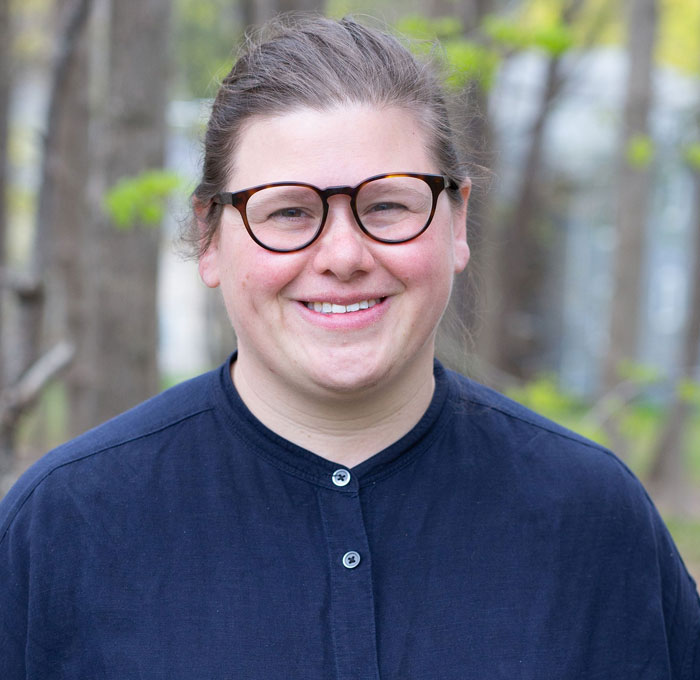
Stephanie Kennedy
וַיֹּ֤אמֶר מֹשֶׁה֙ אֶל־בְּנֵ֣י יִשְׂרָאֵ֔ל רְא֛וּ קָרָ֥א יְהֹוָ֖ה בְּשֵׁ֑ם בְּצַלְאֵ֛ל בֶּן־אוּרִ֥י
בֶן־ח֖וּר לְמַטֵּ֥ה יְהוּדָֽה׃ וַיְמַלֵּ֥א אֹת֖וֹ ר֣וּחַ אֱלֹהִ֑ים בְּחָכְמָה בִּתְבוּנָ֥ה וּבְדַ֖עַת
וּבְכָל־מְלָאכָֽה׃ וְלַחְשֹׁ֖ב מַֽחֲשָׁבֹ֑ת לַעֲשֹׂ֛ת בַּזָּהָ֥ב וּבַכֶּ֖סֶף וּבַנְּחֹֽשֶׁת׃ וּבַחֲרֹ֥שֶׁת אֶ֛בֶן
לְמַלֹּ֖את וּבַחֲרֹ֣שֶׁת עֵ֑ץ לַעֲשׂ֖וֹת בְּכָל־מְלֶ֥אכֶת מַחֲשָֽׁבֶת׃וּלְהוֹרֹ֖ת נָתַ֣ן בְּלִבּ֑וֹ
And Moses said to the Israelites: See, God has singled out by name Bezalel, son of Uri son of Hur, of the tribe of Judah, endowing him with a divin e spirit of skill, ability, and knowledge in every kind of craft, and inspiring him to make designs for work in gold, silver, and copper, to cut stones for setting and to carve wood—to work in every kind of designer’s craft—and [God] has put in his heart that he may teach.
Shemot 35:30-34
I grew up in the home of a community organizer and an architect. A particular source of pride for me as a child was my parent’s involvement in turning a local dilapidated lot on our street into a community garden. It is no wonder that Bezalel’s story touched the furthest corners of my heart. With deep gratitude to my parents, I recognize that this early experience of community organizing, and creative vision inspired the type of change-seeking path to which I continue to aspire.
As a young adult, I craved something in the spirit of the Mishkan: a place built by the generous heartedness of community, a place whose inclusiveness was wide enough for God, a place where I, a curious Jew from an alternative Jewish community, could find a safe, accessible, and progressive connection to Torah that was also deeply rooted in tradition. In many ways, Hebrew College is that place. Thank you to our teachers for identifying the Bezalel like qualities with which we have each been endowed. Thank you for showing us how to use these qualities to help build a home for God and the Jewish people. With the knowledge of your support, I leave open-hearted and open-handed.
Rainer Maria Rilke reminds us to “be patient toward all that is unsolved in your heart and try to love the questions themselves, like locked rooms.” My cohort has taught me to start dance parties at the entrance to not-yet-unlocked doors. They’ve helped me see firsthand that when Jewish learning is creative, sincere, and playful, it offers opportunities for individuals to discover themselves alongside their unique Jewish community. Thank you to my beloved cohort, who have infused so much joy, generosity, and companionship into the last five years. May we continue to see the Divine in Torah, in our new communities, and in one another.
Thank you to my wife and daughter for absolutely everything else.
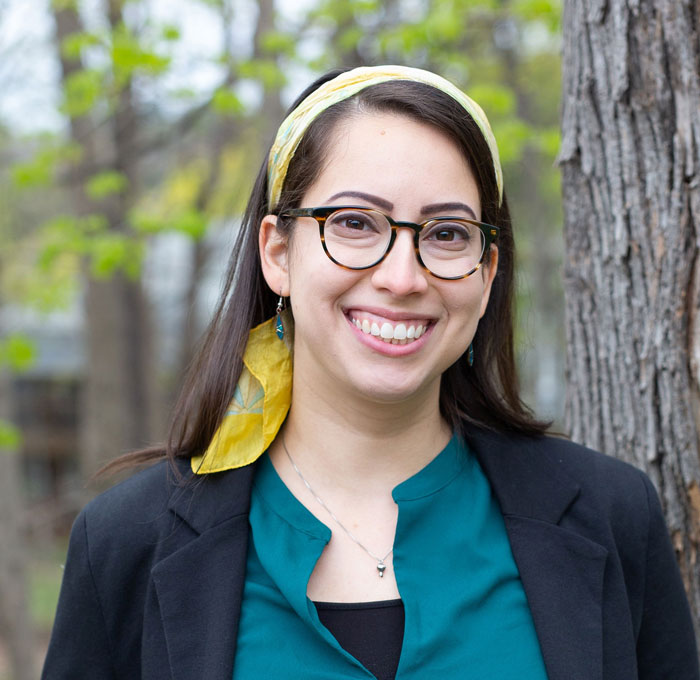
Talia Laster
וְהַעֲרֶב נָא ה’ אֱלֹקינוּ אֶת־דִּבְרֵי תוֹרָתְךָ בְּפִֽינוּ
Sweeten, Hashem Our God, the words of Your Torah in our mouths…(Morning Liturgy)
Each morning, I say this line and pray that the Torah I utter this day will be sweet.
Our Torah artistically renders so much of the human experience, replete with suffering and heartbreak, challenge and confusion, alienation, and loss. Just as with life, engaging with Torah can often draw us into these emotions. וְהַעֲרֶב נָא reminds me to tilt the scales of my learning toward sweetness and beauty. Love and resilience. Connection and stability.
“God, make pleasant the words of Torah in our mouths.”
Why is this in the imperative, asking God to make Torah sweet, or pleasant? This seems to say that the flavor of Torah changes day to day, and it is not in our control. It may be our role to keep the words of Torah in our mouths, but we may need help from the Universe to make them taste good.
The root ערב also has another meaning. In addition to pleasant or sweet, it can also refer to surety, or accountability. Read this way, וְהַעֲרֶב נָא pleads – Please guarantee this Torah that is in our mouths. Make our learning benefit all who have a stake in it. Make it real and grounded, relevant, and connective.
I am grateful to my teachers near and far, classmates, and hevrusos for helping me find my place alongside Torah, for trusting me with it, and for carrying it alongside me.
And I am grateful to my family and other dear ones for your support and wisdom, and for bringing so much sweetness to my life.
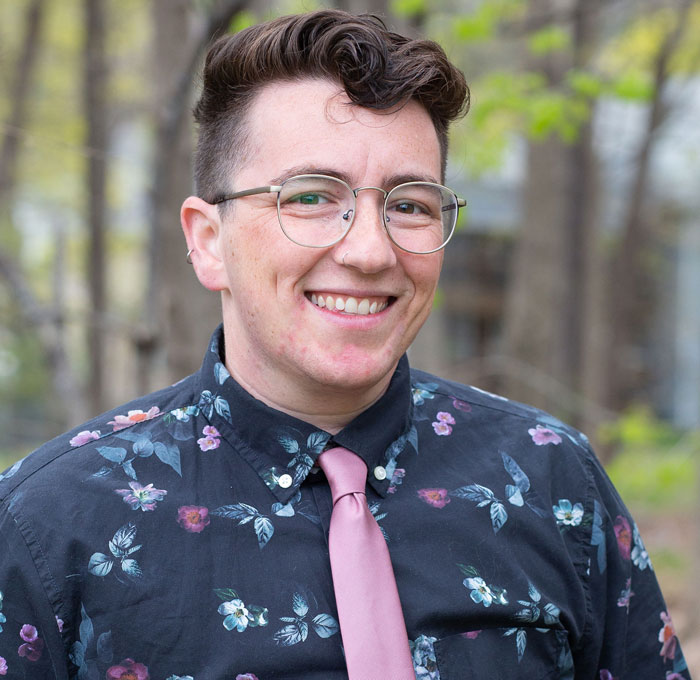
Frances Michal Raffel Sandmel
…פְּתַח לִבִּי בְּתוֹרָתֶךָ, וּבְמִצְוֹתֶיךָ תִּרְדּוֹף נַפְשִׁי
יִהְיוּ לְרָצוֹן אִמְרֵי פִי וְהֶגְיוֹן לִבִּי לְפָנֶיךָ ה׳ צוּרִי וְגוֹאֲלִי
Open my heart through your Torah, and my soul will pursue your mitzvot… May the words of my mouth and the reason in my heart be desirous for before you, God, who shapes me and who frees me. Berakhot 17a
In a college class I drew a diagram of a ritual machine. When a person went into the ritual machine it separated them from society, it broke them down, and it rebuilt them anew on the other side, creating a transformed person.
For rabbinical school to work, we must separate enough from the world so that we can transform into rabbis. The ritual separation ends at ordination, after which we go back out into the world transformed, ready to serve in a new way.
But it is impossible to keep the world at bay for all these years, and the world these past few years has been particularly unruly, demanding our attention and presence.
Each step forward through this ritual machine is a balancing act. I have been drawn inward towards deepening my relationship with myself and with the Divine and the Infinite, and towards seeking wisdom from ancestors and teachers. And I have been pulled outwards, into my communities, my relationships, and the world – each of which needs time, care and tending.
Day by day, my endlessly thoughtful, intentional, and caring community brought me along and held me up. Colleagues, mentors, teachers, comrades, fellow homebuilders, students, family, friends, and neighbors; the people around me, near or far, day to day or occasional, support me in knowing when to lean where, and catch me when I’m falling. I am so humbled and grateful for the love and support that carried me and continues to shape me.
I can’t say exactly what will greet me on the other side of this time of learning; if the past few years have taught me anything, it is to hold lightly onto expectations for the future.
In lieu of a clear, determined future, I head out into the world committed to a slow, careful journey. Moving out of this liminal space, turning my full attention back to the world around me, I hope to make sure each choice I make—big or small—is in service of a freer, more just, and more healed future.
I leave equipped with the tools of תּוֹרָה—Torah and מִצְוֹת— mitzvot. Torah that extends far beyond the scroll, and mitzvot that manifest infinitely as we discover more ways to make our world more whole. And I leave more deeply attuned to the divine spark within me, helping me know how to understand the world—וְהֶגְיוֹן לִבִּי, higayon libi, the reason in my heart—and helping guide what my voice in the world should be—ִאִמְרֵי פִֽי, imrei fi, the words of my mouth.
I am in awe of the way this environment of curiosity and experimentation has transformed me. I leave with more surety of the ground beneath me, openness towards the unimaginable future, and—baruch haShem—my cup full of learning and support such that I am ready to offer support and learning to others.
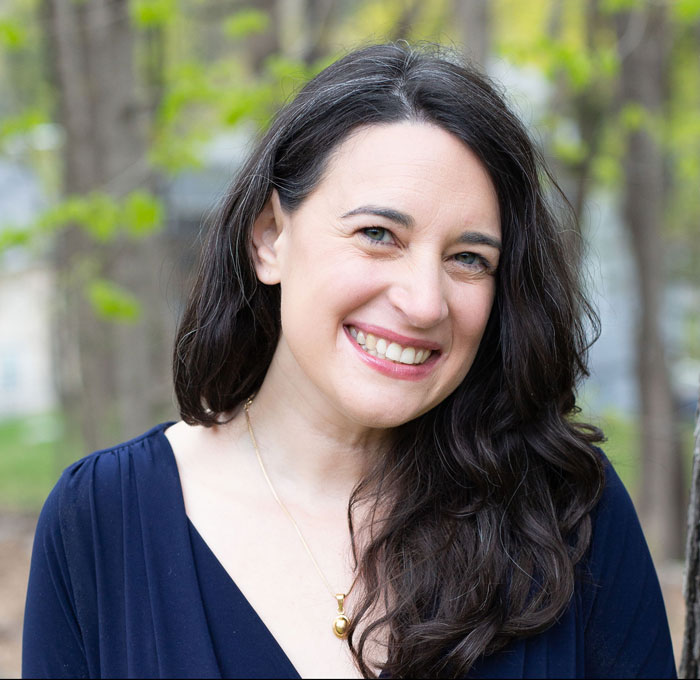
Yael Werber
וְשַׁבְתִּ֥י בְּבֵית־יְ֝הֹוָ֗ה לְאֹ֣רֶךְ יָמִֽים
I shall dwell in the house of Adonai for many long years.
Psalms 23:6
And I’d discuss the holy books…several hours every day, and that would be the sweetest thing of all. (Tevye, Fiddler on the Roof)
The ending of Psalm 23 has always felt like a verse of longing to me. Akin to Tevye’s words, a declaration of desire to sit in God’s house of loving-kindness, of abundance, of connection, and of love. That if we were just able to lengthen our time there, we would be fulfilled. It also feels like a promise. An agreement between me and the Kadosh Baruch-Hu, that we promise to sit together, whatever hardships or twists in the road might come, to sit and be together for many long days. And that feels like the sweetest thing of all.
This fragment of a pasuk, with its valence of both longing and promise, has carried me through all five years of rabbinical school. Each year with its own rises and falls, its own failures and successes and its own moments of tears and moments of pure joy. And each year I found myself recommitting and reconnecting to the house of Adonai; to studying the holy books and finding their deep meaning, as well as to sitting with others through sweetness and pain without any plans of stopping. This is the foundation that has sustained me and also the vision and hope I take with me as I step into the world for the first time as Rabbi!!!
To study the holy books—I have nothing but words of gratitude. Most importantly to my first teachers, my parents, who have each taught me what being a rabbi means in their own way, and what it means to live a life directed by kindness. To my teachers and all of Hebrew College; thank you for your words of Torah, for your guidance on my path toward finding my own voice, and for providing the container for discovering the great joy of our holy tradition. To my mentors, thank you for your intentionality and care as I took my first (wobbly) steps toward my future, and for leading by extremely awe-inspiring example.
To sit together in times of sweetness and pain–my immense love goes to my cohort and Pod who have sat with me through it all. Reassured me when I needed lifting up, celebrated me with no need for celebrations of their own, and made sure I was laughing the entire way. I couldn’t have done it without you.

